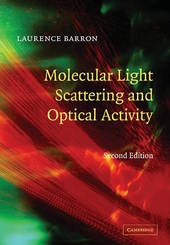
|
Molecular Light Scattering and Optical Activity
Paperback / softback
Main Details
| Title |
Molecular Light Scattering and Optical Activity
|
| Authors and Contributors |
By (author) Laurence D. Barron
|
| Physical Properties |
| Format:Paperback / softback | | Pages:468 | | Dimensions(mm): Height 244,Width 170 |
|
| Category/Genre | Physical chemistry
Biochemistry |
|---|
| ISBN/Barcode |
9780521121378
|
| Classifications | Dewey:541.7 |
|---|
| Audience | | Postgraduate, Research & Scholarly | | Professional & Vocational | |
|---|
| Edition |
2nd Revised edition
|
|
Publishing Details |
| Publisher |
Cambridge University Press
|
| Imprint |
Cambridge University Press
|
| Publication Date |
15 October 2009 |
| Publication Country |
United Kingdom
|
Description
Using classical and quantum methods with a strong emphasis on symmetry principles, this book, a reissue of the 2004 second edition, develops the theory of a variety of optical activity and related phenomena from the perspective of molecular scattering of polarised light. In addition to the traditional topic of optical rotation and circular dichroism in the visible and near-ultraviolet associated with electronic transitions, the newer topic of optical activity associated with vibrational transitions, which may be studied using both infrared and Raman techniques, is also treated. Ranging from the physics of elementary particles to the structure of viruses, the subject matter of the book reflects the importance of optical activity and chirality in much of modern science and will be of interest to a wide range of physical and life scientists.
Author Biography
Laurence Barron is currently Gardiner Professor of Chemistry at Glasgow University. His research interests include electric, magnetic and optical properties of molecules, especially chiral phenomena including Raman optical activity which he pioneered.
ReviewsReview of the hardback: 'In many respects, some fundamental science has now been rethought, and this book is a perfect means of mastering new aspects of this exciting discipline. I applaud the clarity and accuracy of the writing which cuts no corners and is not afraid of listing outstanding problems yet to be solved ... Why the need for this book? Rigid self-disciplining and precise attention to detail (akin to perfecting Latin and Green in earlier times) must be trained into researchers, or else momentum is lost and the subject dies'. Chemistry and Industry
|